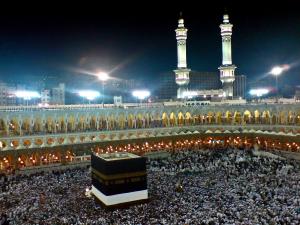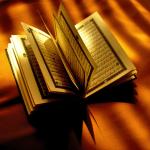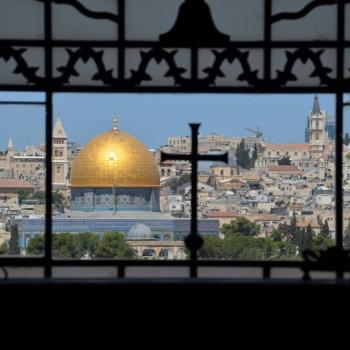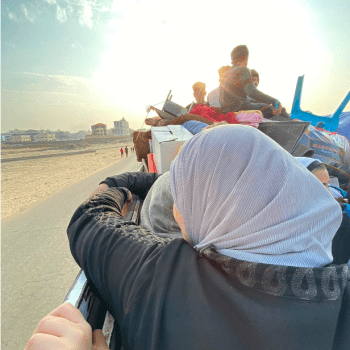Prayer is an integral part of the Muslim lifestyle – as I mentioned yesterday, prayer (salat) is one of the five pillars of Islam, and for many, the practice of prayer takes on a special significance during Ramadan. So if we want to understand Islam a little better, it’s worth taking a minute to learn a little about it.
When I lived in Jeddah, Saudi Arabia, the whole rhythm of every day was built around the five prayer times. Fajr is the dawn prayer; dhuhr is midday; asr is afternoon, maghrib is evening, and isha is the night prayer. The call to prayer comes on loudspeakers from every mosque (and there’s one on practically every block) – here’s what it sounds like:
The sound fills the air, and every shop – from the smallest mom-and-pop bakery to the megamalls – closes down and shuts off its lights to encourage shoppers and employees to go and pray.
During Ramadan, the city grows very quiet just before the sunset prayer call. The streets, usually packed with rush hour traffic, are deserted (except for a few overachievers like my husband, who stayed too long at work and are rushing home). Just now, listening to this prayer call video, actually makes me very homesick.
After fasting for 12 or 14 or 16 hours, when at last it’s time to eat, the traditional way to break the fast is with a glass of water and a couple of dates – but before digging into the serious food, many Muslims will go and pray. Yes, as hungry as they are, they stop after a couple of bites and go spend time before God.
The words for the five prayers, and the positions or “prostrations,” are all predetermined, and replicate the way the prophet Mohammad used to pray. Every Muslim around the world faces in the direction of Mecca (about 50 miles from where we lived in Jeddah).
I’ve seen my husband pray countless times, watched prayers performed in Mecca via video cameras trained on the inside of the Grand Mosque. I’ve observed prayers in mosques in Jerusalem, Istanbul, Casablanca, and several places in the US – and I can say with certainty that it’s the same everywhere.
Fun story: my mother-in-law spent time with us when we lived in Saudi Arabia. She had back troubles, so when she prayed, she used to do modified prostrations. She remained seated on the floor with her legs crossed for the whole prayer, and bowed her head to touch the ground from this position. Once I remember there was a can of Pif-Paf (bug spray) just in front of where her head touched the floor – so it looked like she was praying to the can of Pif-Paf. I had to restrain myself from giggling.
 Apples and oranges
Apples and oranges
I used to think that Christian prayer was waaaaayyy better than Muslim prayer because “we” talk freely to God about whatever we want to, while “they” are under obligation to say the same things every day. I assumed that such repetition was bound to make the mind wander, and that many people probably just go through the motions.
I felt like Christian prayer was more evolved – even though Jesus gave us a standard prayer too, which I had recited for my whole life (with varying degrees of attentiveness):
“This, then, is how you should pray: ‘Our Father who art in heaven, hallowed be thy name…’ (Matt. 6:9)
More recently, I’ve come to understand that it’s really apples and oranges, and I’ve begun to appreciate the unique spirit of each type of prayer.
Muslims know that no matter what time of day it is, they are going to stand before God soon and say something like,
“O God, how perfect You are and praise be to You. Blessed is Your name, and exalted is Your majesty. There is no god but You. Guide us along the straight path.”
Checking in with the Creator of the universe five times every day might have a positive effect on one’s life, don’t you think?
Many Christians make a routine of Quiet Time in between our Sunday visits to the house of God, and/or we attend a midweek Bible study, and/or listen to worship music during the day. These practices help keep us mindful of God throughout the week. That’s our spiritual discipline. That’s our salat.
By the way, if you are concerned that Muslims have no freedom to speak their hearts to God, know this: at the end of the standard Muslim prayer, one is welcome to linger before God indefinitely to make du’a, or supplication – five times a day (and anytime at all in between).
The ideal of Christian prayer is wonderful: coming to God with adoration, confession, thanksgiving, and supplication (the famous A.C.T.S. format); talking to God with our whole heart and our full attention. But we all know that we don’t live up to this ideal.
Of course, Muslims’ minds wander too – probably at about the same rate as ours. I’m ashamed now for looking down on others because they prayed differently.
Each of us relates to God according to our upbringing, our experiences, and countless influences in our lives. I’m thankful for the diversity in how we worship and honor God.
Is there something you wonder about, about Ramadan, or Islam? I’m not an expert, but I’ve spent much of the last 35 years with at least one foot in the Muslim world, and my husband has spent his whole life a Muslim (Sunni mostly, but he has moved into progressive Islam in recent years). If you have a question, you’re welcome to send it to [email protected], and we may take a stab at answering it. We don’t have all the answers, or presume to speak for all Muslims, but we will do our best.
OTHER POSTS TO CHECK OUT:
Ramadan for Christians: fasting is jihad
Ramadan for Christians: the basics of Ramadan
We’ve made God in our image, and we’re answering our own prayers
Christianity and Covid: “freedom” shouldn’t be deadly
FEATURED IMAGE: “Mecca” by ♥ForUrEyeZOnly♥ is licensed under CC BY-NC-ND 2.0













